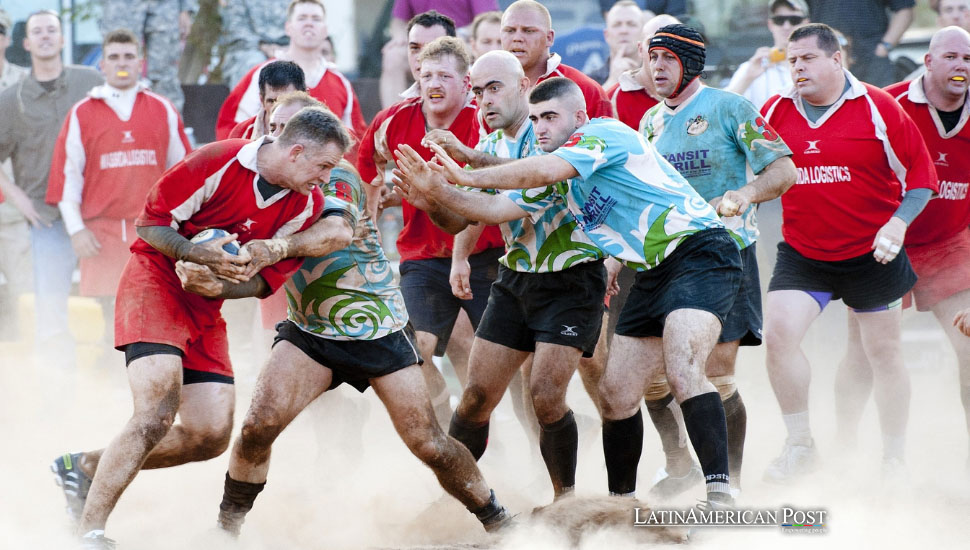Rugby’s Rise Across Latin America

In the heart of soccer’s kingdom, rugby is carving out its empire in Latin America. From Argentina’s storied pitches to Brazil’s burgeoning clubs and Uruguay’s grassroots movements, rugby is gaining popularity, impacting communities and altering the sports culture.
In a continent where soccer is not just a sport but a religion, the rise of rugby in Latin America signals a significant cultural shift. Traditionally seen as the bastion of countries like New Zealand, England, and South Africa, rugby’s increasing popularity in Latin American nations such as Argentina, Brazil, and Uruguay is a testament to the sport’s universal appeal and the changing tastes of the sporting populace.
Argentina: The Trailblazer in Latin American Rugby
Argentina’s Pumas have long been the standard-bearers for rugby in Latin America. Their success on the international stage, highlighted by semi-final appearances in the Rugby World Cup, has inspired a nation and set a benchmark for neighboring countries. The development of professional leagues and academies has played a pivotal role in nurturing talent and increasing the sport’s visibility. Rugby in Argentina transcends the game; it is a vehicle for social mobility and education, with programs to bring the sport to underprivileged communities, promoting teamwork, respect, and discipline.
Brazil: The Emerging Giant
Brazil, synonymous with soccer greatness, is witnessing a rugby renaissance. The sport’s inclusion in the 2016 Rio Olympics provided a significant boost, exposing rugby to a broader Brazilian audience. Efforts by the Brazilian Rugby Confederation to capitalize on this momentum have seen the introduction of comprehensive grassroots programs targeting schools and universities. The creation of the Brazil Super League has provided a platform for local talent while attracting international players and coaches, further enhancing the competitive standard and appeal of the sport. Rugby’s growth in Brazil reflects a broader desire for diverse sporting experiences, challenging the mono-sport culture dominated by soccer.
Uruguay: The Quiet Achiever
Uruguay’s rugby story is one of perseverance and triumph against the odds. With fewer resources than its larger neighbors, Uruguay has made significant strides on the international stage. The national team, Los Teros, has become a regular fixture at the Rugby World Cup, embodying the spirit of the Uruguayan people. Grassroots development has been crucial, with clubs and schools nationwide introducing rugby to young athletes. Uruguay’s success is a powerful narrative of how passion and determination can overcome resource limitations, inspiring smaller nations in the region.
Beyond the field, rugby’s impact in Latin America extends into the social fabric of communities. The sport is renowned for its inclusivity, camaraderie, and ethos, which resonate deeply in a region plagued by social inequality and political divisions. Rugby clubs have become community hubs, offering safe spaces for young people to learn and grow, far removed from the challenges of their everyday lives. Moreover, rugby’s emphasis on respect—for opponents, officials, and the game itself—instills a sense of discipline and fairness that transcends the sport.
Challenges and Opportunities
Despite its growing popularity, rugby in Latin America faces challenges. The dominance of soccer means that rugby often operates in its shadow, with limited media coverage and commercial investment. Infrastructure and funding remain significant hurdles for many aspiring rugby nations in the region. However, these challenges also present opportunities. The rugby community in Latin America is tightly knit, driven by a shared passion for the game and its values. There is a growing sense that rugby offers something unique, an alternative to the commercialization and corruption that have tainted other sports.
As rugby gains ground in Latin America, its future looks promising. The sport’s ability to unite people, regardless of background or social status, is a powerful force for change. With continued investment in grassroots development and a commitment to maintaining the sport’s core values, rugby can aspire to reach new heights in the region. The rugby journey in Latin America is about challenging soccer’s dominance and enriching the continent’s sporting culture with diversity, inclusivity, and integrity.
Also read: The Ascent of Brazilian Volleyball on the World Stage
In the sprawling cities and quaint towns across Argentina, Brazil, and Uruguay, rugby balls are increasingly seen alongside soccer balls. This shift signifies a broadening of Latin America’s sporting landscape, where rugby’s values of respect, teamwork, and community engagement offer a compelling alternative to the beautiful game. As rugby’s roots grow deeper in Latin American soil, it promises to bring forth a new era of sporting excellence and community development.





